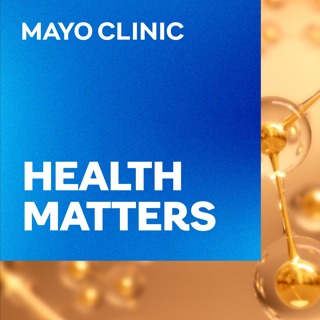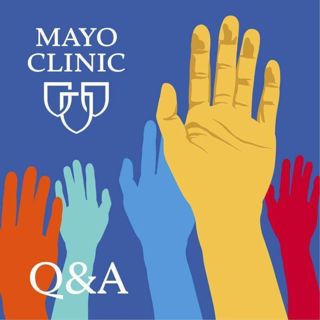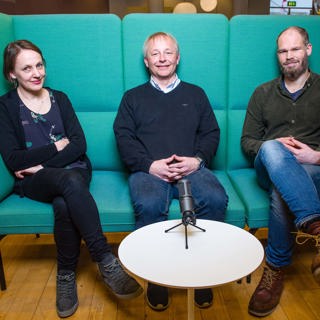
Don’t delay lifesaving cancer tests, treatments because of COVID-19
The COVID-19 (https://www.mayoclinic.org/coronavirus-covid-19) pandemic has changed, canceled and delayed many parts of people's lives, including when or if they seek medical care. Dr. Robert McWilliams (https://www.mayoclinic.org/biographies/mcwilliams-robert-r-m-d/bio-20054921), a Mayo Clinic medical oncologist, says there are various reasons patients may be avoiding or delaying care. But he emphasizes that coming to medical institutions is safe, and that ignoring symptoms or delaying exams can result in more severe illness or even death. "Early on in the pandemic, we said to postpone elective care," says Dr. McWilliams. "Unfortunately, I think a lot of people view cancer screening as part of elective care. It's really not." On this Mayo Clinic Q&A podcast, Dr. McWilliams talks about the importance of cancer screenings, which cancer patients are at higher risk of COVID-19, whether patients receiving cancer treatment should be vaccinated for COVID-19 and how the acceleration of telehealth has been a silver lining of the pandemic. Advertising Inquiries: https://redcircle.com/brands Privacy & Opt-Out: https://redcircle.com/privacy
2 Mar 202119min

Screening for colorectal cancer can be prevention
Colorectal cancer is a term that includes colon (https://www.mayoclinic.org/diseases-conditions/colon-cancer/symptoms-causes/syc-20353669) and rectal (https://www.mayoclinic.org/diseases-conditions/rectal-cancer/symptoms-causes/syc-20352884) cancers, both of which originate in the lower portion of the large intestine and into the rectum. "The vast majority of the time, we don't know exactly what causes any specific cancer," says Dr. Jeremy Jones (https://www.mayoclinic.org/biographies/jones-jeremy-c-m-d/bio-20469882), a Mayo Clinic oncologist. "But there are a number of factors that can increase the risk of developing colon or rectal cancer." Dr. Jones says one risk factor is increasing age. However, he adds that over the last 30 years younger patients have seen a 50% increased risk of developing colon and rectal cancers. In this Mayo Clinic Q&A podcast, Dr. Jones talks about risk factors, symptoms, treatment, health care disparities and the latest in colorectal cancer research. Advertising Inquiries: https://redcircle.com/brands Privacy & Opt-Out: https://redcircle.com/privacy
1 Mar 202139min

Less pain and faster recovery with minimally invasive heart surgery
Smaller incisions, less pain and faster recovery are just a few reasons minimally invasive heart surgery (https://www.mayoclinic.org/tests-procedures/minimally-invasive-heart-surgery/about/pac-20384895) can be a good option for patients with heart disease. "I would define minimally invasive heart surgery, or robotic-assisted surgery as essentially performing a standard surgical operation through smaller incisions, without going through the breastbone," says Dr. Phillip Rowse (https://www.mayoclinic.org/biographies/rowse-phillip-g-m-d/bio-20434936), a Mayo Clinic cardiovascular surgeon. Treating mitral valve disease (https://www.mayoclinic.org/diseases-conditions/mitral-valve-disease/symptoms-causes/syc-20355107) (https://www.mayoclinic.org/diseases-conditions/mitral-valve-disease/symptoms-causes/syc-20355107)is one example of how often robotic-assisted heart surgery is performed at Mayo Clinic. "Mayo treats about 120 cases, or more, robotically each year," Dr. Rowse says. "We have dedicated cardiologists who are in the room performing the echo tests at the time of surgery and right afterwards." In this Mayo Clinic Q&A podcast, Dr. Rowse discusses who's eligible for this surgery and what's involved with minimally invasive heart surgery. Advertising Inquiries: https://redcircle.com/brands Privacy & Opt-Out: https://redcircle.com/privacy
26 Feb 202118min

COVID-19 variants and the evolving science
People may be curious, confused or critical of what seem to be changing messages related to the COVID-19 (https://www.mayoclinic.org/coronavirus-covid-19) pandemic. Dr. Gregory Poland (https://www.mayoclinic.org/biographies/poland-gregory-a-m-d/bio-20053165), an infectious diseases expert and head of Mayo Clinic's Vaccine Research Group (https://www.mayo.edu/research/labs/vaccine-research-group/overview), reminds folks that messages change because data changes and the science evolves. "As we learn new science, we use that science to modify our recommendations," says Dr. Poland. "It's not that scientists are flip-flopping. It is that new data allows us to begin expanding those recommendations." For instance, COVID-19 cases and deaths in the U.S. are currently declining. But, Dr. Poland says, there are new data predicting the possibility of another surge of COVID-19 infections in March because of U.K. variant transmission. In this Mayo Clinic Q&A podcast Dr. Poland talks about several issues, including the U.K. variant, vaccine development and the public’s COVID-19 fatigue. Advertising Inquiries: https://redcircle.com/brands Privacy & Opt-Out: https://redcircle.com/privacy
24 Feb 202126min

Hidden gallbladder and bile duct cancers
The gallbladder (https://www.mayoclinic.org/gallbladder-and-bile-duct/img-20008461) is a small, pear-shaped organ that sits just beneath the liver, on the right side of the abdomen. Slender tubes that carry bile fluid also are also located in that area. Because of the relatively hidden nature of the gallbladder and bile ducts, cancers can grow without being detected. Late detection can mean a poor prognosis. Dr. Kabir Mody (https://www.mayoclinic.org/biographies/mody-kabir-m-d/bio-20097397), former co-chair of the Hepatobiliary Disease Group at Mayo Clinic Cancer Center (https://www.mayoclinic.org/departments-centers/mayo-clinic-cancer-center), says February is the awareness month set aside to educate people about these rare cancers. In this Mayo Clinic Q&A podcast, Dr. Mody talks about symptoms, detection, surgical interventions and treatments for gallbladder and bile ducts cancers. Advertising Inquiries: https://redcircle.com/brands Privacy & Opt-Out: https://redcircle.com/privacy
22 Feb 202126min

Symptoms for cardiac amyloidosis overlap with other conditions
Cardiac amyloidosis (https://www.mayoclinic.org/tests-procedures/heart-transplant/multimedia/how-does-amyloid-affect-the-heart/vid-20207025) is irreversible thickening of the heart muscle that typically presents as a form of congestive heart failure (https://www.mayoclinic.org/diseases-conditions/heart-failure/symptoms-causes/syc-20373142). It is overlooked often because the symptoms can masquerade as other conditions. Unfortunately, there aren't any preventive strategies for cardiac amyloidosis, says Dr. Melissa Lyle (https://www.mayoclinic.org/biographies/lyle-melissa-a-m-d/bio-20491562), a Mayo Clinic cardiologist. "So the key, really, is early detection," says Dr. Lyle. "We want to make sure that we can detect these patients earlier, to get them on the right treatments." She says it's important that patients bring any concerning symptoms to their health care provide, as soon as possible. In this Mayo Clinic Q&A podcast, Dr. Lyle explains what those symptoms might be and talks about new therapies for treating cardiac amyloidosis. Advertising Inquiries: https://redcircle.com/brands Privacy & Opt-Out: https://redcircle.com/privacy
19 Feb 202115min

Tackling the latest COVID-19 topics
Medical research reveals new information about COVID-19 (https://www.mayoclinic.org/coronavirus-covid-19) daily. While scientists and medical experts focus on virus spread, new variants, improved therapeutic treatments and more, it's sometimes difficult for the public to keep up with evolving information. In this Mayo Clinic Q&A podcast, Dr. Gregory Poland (https://www.mayoclinic.org/biographies/poland-gregory-a-m-d/bio-20053165), an infectious diseases expert and head of Mayo Clinic's Vaccine Research Group (https://www.mayo.edu/research/labs/vaccine-research-group/overview), helps by answering a number of common questions and addressing these COVID-19 topics: * Antibody tests after having a COVID-19 vaccine. * Monoclonal antibodies. * COVID-19 variants. * Side effects, especially after the second dose of a COVID-19 vaccine. * Vaccinating children and attending school in person. * Whether COVID-19 vaccines an be interchanged. * Mask-wearing recommendations. * Appearance of long-hauler symptoms are more often in women. * Pregnant, breastfeeding mothers and the COVID-19 vaccines. Advertising Inquiries: https://redcircle.com/brands Privacy & Opt-Out: https://redcircle.com/privacy
17 Feb 202136min

Advancing research, challenging cancer
Almost half of all people in the U.S. are at risk of developing some form of cancer in their lifetime, according to the National Cancer Institute. For women, it's often breast cancer (https://www.mayoclinic.org/diseases-conditions/breast-cancer/symptoms-causes/syc-20352470). For men, it's prostate cancer (https://www.mayoclinic.org/diseases-conditions/prostate-cancer/symptoms-causes/syc-20353087). For both populations lung cancer (https://www.mayoclinic.org/diseases-conditions/lung-cancer/symptoms-causes/syc-20374620) and colorectal cancer (https://www.mayoclinic.org/diseases-conditions/rectal-cancer/symptoms-causes/syc-20352884) are common. Dr. Paul Limburg (https://www.mayoclinic.org/biographies/limburg-paul-j-m-d/bio-20053688), a Mayo Clinic gastroenterologist and cancer researcher with the Mayo Clinic Cancer Center (https://www.mayoclinic.org/departments-centers/mayo-clinic-cancer-center?mc_id=us&utm_source=newsnetwork&utm_medium=l&utm_content=content&utm_campaign=mayoclinic&geo=national&placementsite=enterprise&cauid=100721), says you can lower your risk of cancer by knowing your personal and family medical histories, as well as developing a healthy lifestyle that includes exercise. He also says researchers are studying healthy people to see whether medications or supplements could help modify cancer risk. "It's called chemo prevention," says Dr. Limburg. "It goes back to the biologic development of cancers, precancers. For example, inflammation seems to be an important contributor to the development of cancer, so could anti-inflammation medications help reduce cancer risk?" In this Mayo Clinic Q&A podcast, Dr. Limburg talks more about cancer research at Mayo, including new technologies and the possibility of a single blood test to screen for multiple cancers. Advertising Inquiries: https://redcircle.com/brands Privacy & Opt-Out: https://redcircle.com/privacy
15 Feb 202123min





















